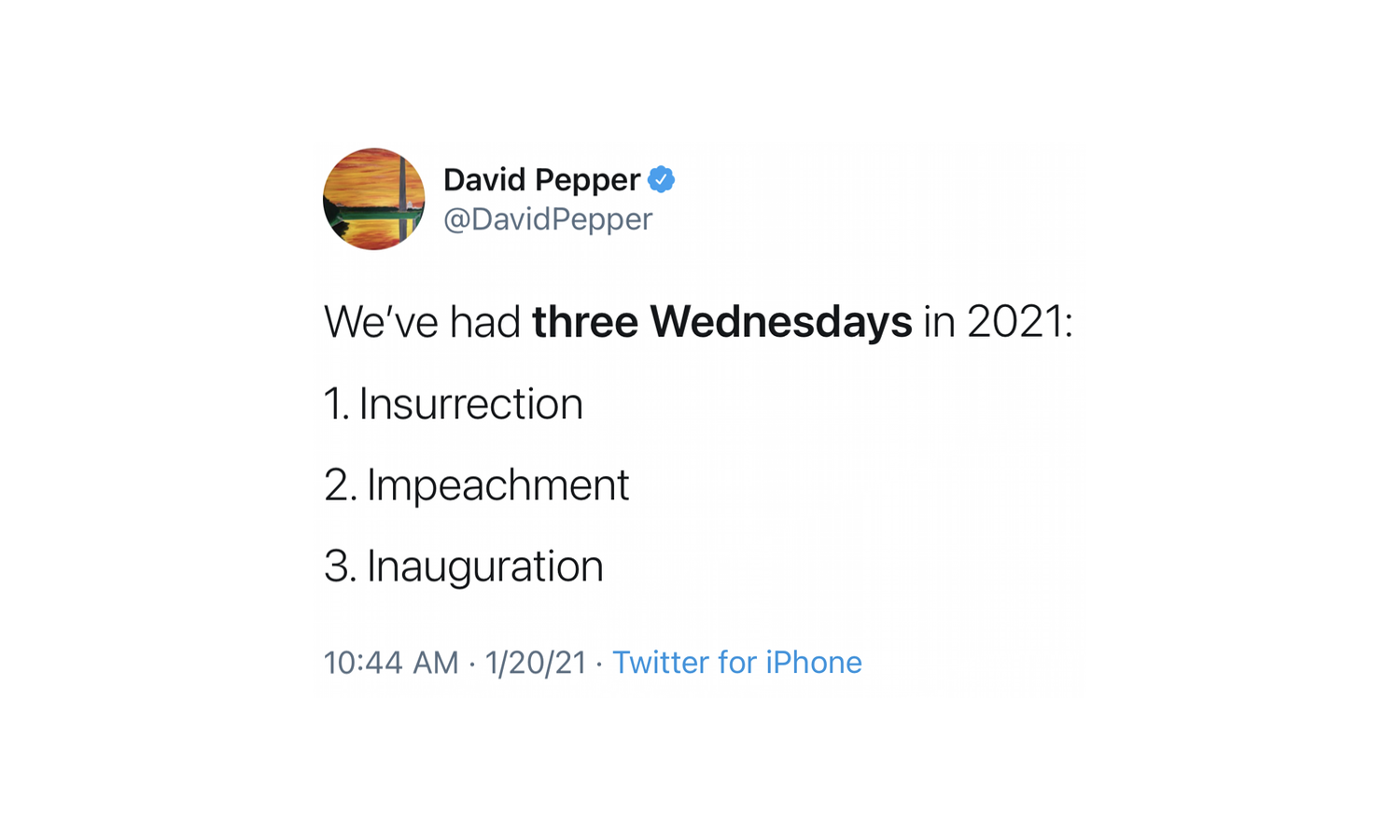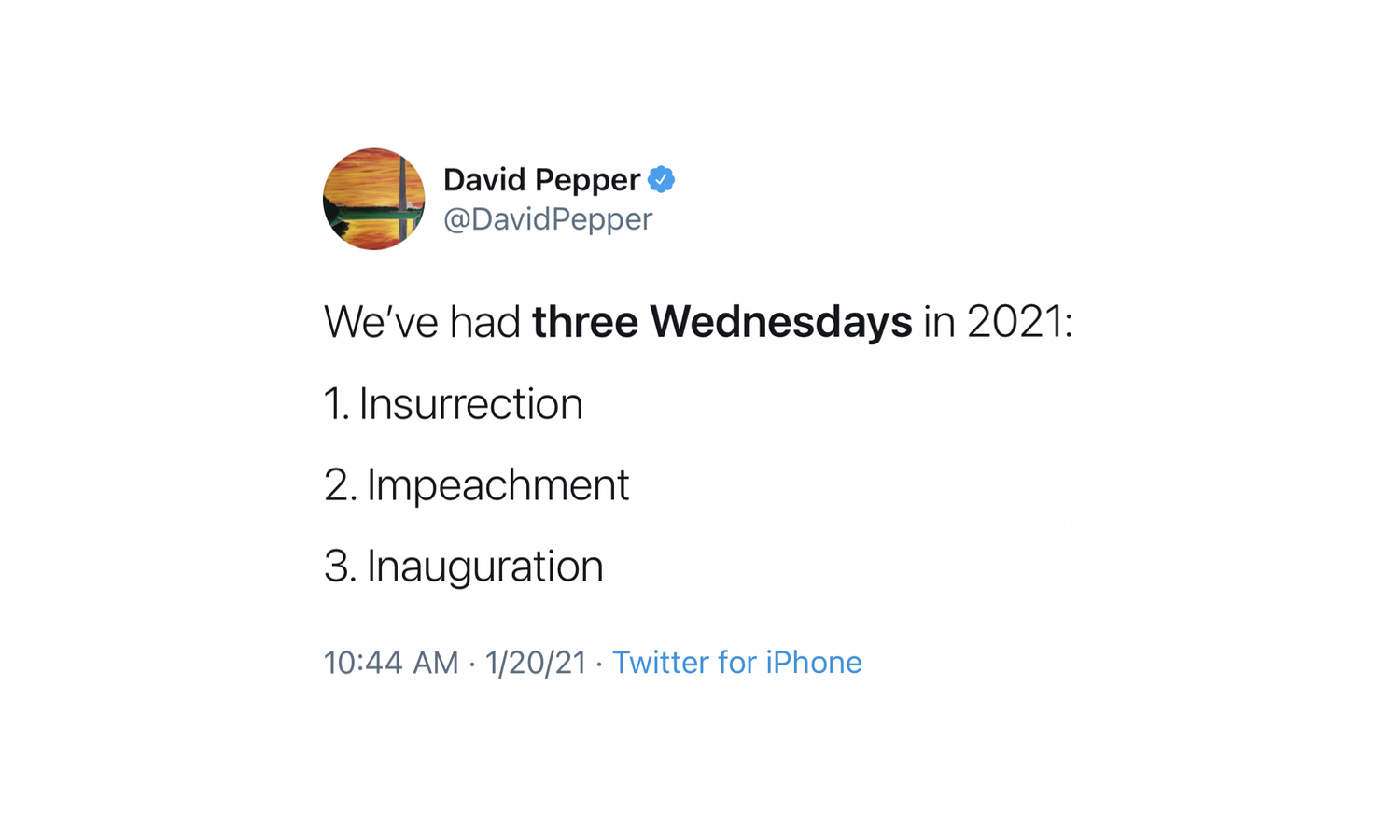The January 2021 Developers Alliance US Policy Update
This tweet from author and former politician David Pepper spawned a moment-defining meme.
Never has a meme so accurately described our monthly US Policy Update. I’m going to assume that you all have been glued to your televisions/Twitter feeds just as much as all of us this month. Well, except for maybe former President Trump, following his ban. It has been a wild few weeks here in DC, but since the inauguration went over without a hitch (thanks to unheard-of levels of security) things will be back to boring on Capitol Hill in no time. Due to the transition, insurrection, and impeachment, the policy agenda with regards to the tech sector (and basically every other industry) has unsurprisingly taken a back seat. The role of the tech sector in the insurrection, however, is front and center. We expect it will continue to be so for the coming months.
The End Of An Era… And Twitter Account
Following what the majority of Americans deemed as “incitement of violence” of the armed rioters on Capitol Hill, (now former) President Trump was permanently de-platformed on basically every online platform available — including, and most notably, his beloved Twitter. The left, while thankful that Trump was finally muzzled, argues that platforms should have acted sooner. Specifically, that they should not be allowed to host information that contributes to the organization of events such as those that happened at the Capitol on January 6th. The right continues to cite freedom of speech concerns and highlight the platforms’ power to decide what speech is (and isn’t) acceptable on their platforms. Given recent events, we expect the Section 230 brawl in Congress to continue, even with the change of regimes. Our team goes more into depth on the issue of whether there is a right to Tweet or not here.
Aside from Trump being de-platformed, many of his supporters found themselves left in the cold when the alternative “free speech” platform they often used, Parler, was dropped from all app stores. Shortly thereafter Parler had their cloud computing contract dropped with AWS, leaving their entire platform disabled for days. AWS cites that Parler was in violation of their terms of service due to hosting content inciting violence (the platform was said to be hosting much content that contributed to and organized the insurrection). Parler, which has already filed a lawsuit against AWS, claims that the move was retaliatory, an antitrust violation, and politically driven given their recent popularity.
On January 21 the court denied Parler’s request for a preliminary injunction citing that the tech platform failed to demonstrate a public interest in stopping the injunction. The opinion states “the Court explicitly rejects any suggestion that the balance of equities or the public interest favors obligating AWS to host the kind of abusive, violent content at issue in this case, particularly in light of the recent riots at the U.S. Capitol… That event was a tragic reminder that inflammatory rhetoric can — more swiftly and easily than many of us would have hoped — turn a lawful protest into a violent insurrection.”
Despite the denial of the injunction, the lawsuit and counter-lawsuit between the two tech companies will continue. The dispute puts Section 230, the right of platforms to moderate content, and tech companies terms of service front and center, and could lead to new interpretations on the highly controversial communications law.
Tech Companies Across The Board Have Stepped Up To Aid In The Transition
While the national mall and surrounding areas became a fortress, Airbnb & Hotel Tonight both suspended their services in Washington, DC around the Inauguration in an attempt to keep visitors (and naturally, protesters) out of town. GoFundMe additionally placed a ban on fundraising initiatives for political events that are likely to turn violent following reports of insurrectionists using crowdfunding initiatives to attend the event.
Online stores including Shopify removed Trump-related content from their platforms following the Capitol attack. Even the home fitness app Peloton got on board by prohibiting “Stop the Steal” related content from their leaderboards citing their ban on “hate, offensive, and obscene speech.”
The Parler and Gab’s of the world continued to allow unfettered content on their platforms, however, more mainstream platforms such as Facebook continued to block false information related to election results, highlighting the need for content moderation. Though the platform admitted their algorithms are “never perfect,” the company continues to have conversations with Congress regarding universal content moderation strategies.
Dozens of companies across all industries —including in the tech sector Microsoft, Google, and Facebook — indicated that they would halt or reevaluate their political action committee contributions to all members of Congress who voted against voter certification.
New Power Dynamics
Joseph R. Biden is now president, the transition, digital and otherwise, has begun. The Democrats have taken the majority in the Senate by a slim margin, after clinching both contested seats in the Georgia Senate runoff earlier this month. Power in the Senate thus changed to Senate Majority Leader Chuck Schumer (D-NY). Mitch McConnell (R-KY) now holds the title of Senate Minority leader. In the House of Representatives, the Democrats kept their slim margin despite Republicans picking up seats. Rep. Nancy Pelosi maintains her title of Speaker of the House. Rep. Kevin McCarthy holds the title of House Minority Leader, however in light of the insurrection and unexpected impeachment vote there has been unease in House Republican leadership with a possible ouster of Chair of the House Republican Conference, Rep. Liz Cheney
(R-WY), who voted for Trump’s impeachment last week along with 9 other members of the delegation. The vote was considered the most bipartisan impeachment in history.
Most cabinet officials have not been confirmed yet and many appointments are still to be announced. We will keep you posted in future newsletters with what the rest of the Biden Administration’s team looks like as they get placed.
On The Executive Agenda…
Beginning with a slew of executive orders undoing much of what the prior administration had put in place using the same process, the Biden Administration began its first days outlining an ambitious agenda.
Cybersecurity and tech modernization is going to be front and center for the incoming administration, with Biden’s team indicating that they plan to allocate $9 billion for the Technology Modernization Fund, including $200 million to expand the hiring of cybersecurity professionals.
Further, Biden has indicated that he plans to make the top White House science post a Cabinet-level role for the first time in history, highlighting the importance the administration will be putting on science and technology policy.
Privacy Shield issues following the recent Schrems II case are on the near-term agenda as Biden’s nominee to lead the Department of Commerce, Gina Raimondo, stated that a U.S.-EU data transfer deal would be a ‘top priority’ if she was confirmed. Raimondo cited the impact of the ruling on American businesses both large and small.
Congress has begun their new term setting their sights on going against the tech amplification algorithms, blasting Twitter, YouTube, and Facebook for harboring a “digital echo chamber” that led to self-radicalization of users on their platforms.
It looks like taxes on that French wine and cheese Former President Trump promised are still a possibility. Biden’s nominee for Treasury Secretary Janet Yellen has indicated that she would “work with the United States Trade Representative to determine our best alternative course of action” if international groups were unable to come to a resolution on the proposed Digital Services Tax. The OECD hopes to finalize a tax deal in the coming months.
Oh Yeah, It’s Still A Pandemic…
A group of tech giants and others have come together to create a “digital vaccination passport” in an effort to get life back to normal in a post-COVID world. The Vaccination Credential Initiative, “a coalition including Microsoft, Oracle, Salesforce, Cerner, Epic Systems, and the Mayo Clinic.” The passport will likely take the form of an app that would present a QR code for scanning by authorities. This method is already used by CommonPass, a member of the VCI. Hopefully, the initiative will have more success than contact tracing apps…






